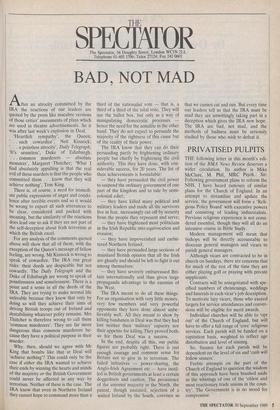SPECT TRE AT OR
The Spectator, 56 Doughty Street, London WC1N 2LL Telephone 01-405 1706; Telex 27124; Fax 242 0603
BAD, NOT MAD
After an atrocity committed by the IRA the reactions of our leaders are quoted by the press like macabre versions of those critics' assessments of plays which are used in theatre advertisements. So it was after last week's explosion in Deal.
`Heartfelt sympathy', the Queen; . . such cowardice', Neil Kinnock; `• . . a pointless atrocity', Daily Telegraph; `It's senseless', Duke of Edinburgh; `. . . common murderers — absolute monsters', Margaret Thatcher; 'What I find absolutely appalling is that the real evil of these murders is that the people who committed them . . . know that. they will achieve nothing', Tom King.
There is, of course, a need for immedi- ate public expressions of anger and condo- lence after terrible events and so it would be wrong to expect all such utterances to be clear, considered and packed with meaning, but the similarity of the reactions does lead one to ask if they are not part of the self-deception about Irish terrorism at which the British excel.
For any analysis of the comments quoted above will show that all of them, with the exception of the Queen's message of fellow feeling, are wrong. Mr Kinnock is wrong to speak of cowardice. The IRA run great risks: their deeds are despicable but not cowardly. The Daily Telegraph and the Duke of Edinburgh are wrong to speak of pointlessness and senselessness. There is a point and a sense in all the deeds of the IRA. They are trying to make normal life unlivable because they know that only by doing so will they achieve their aims of driving British troops out of Ireland and destabilising whatever polity remains. Mrs Thatcher is therefore wrong to call them `common murderers'. They are far more dangerous than common murderers be- cause they have a political purpose in their murder.
Why, then, should we agree with Mr King that bombs like that at Deal will `achieve nothing'? This could only be the case if either the IRA wanted to achieve their ends by winning the hearts and minds of the majority or the British Government could never be affected in any way by terrorism. Neither of these is the case. The IRA know that even in Northern Ireland they cannot hope to command more than a third of the nationalist vote — that is, a third of a third of the total vote. They will use the ballot box, but only as a way of manipulating democratic processes hence the need for the armalite in the other hand. They do not expect to persuade the majority of the rightness of this cause but of the reality of their power.
The IRA know that they can do their persuading partly by frightening ordinary people but chiefly by frightening the civil authority. This they have done, with con- siderable success, for 20 years. The list of their achievements is formidable:
— they have persuaded the civil power to suspend the ordinary government of one part of the kingdom and to rule by semi- colonial edict; — they have killed many political and military leaders and made all the survivors live in fear, increasingly cut off by security from the people they represent and serve; — they have frightened most politicians in the Irish Republic into equivocation and evasion; — they have impoverished and embit- tered Northern Ireland; — they have persuaded large sections of mainland British opinion that all the Irish are ghastly and should be left to fight it out among themselves; — they have severely embarrassed Bri- tain internationally and thus given large propaganda advantage to the enemies of the West.
The IRA meant to do all these things. For an organisation with very little money, very few members and very powerful opponents they have done almost unbe- lievably well. All they meant to show by killing bandsmen in Deal was that they had lost neither their 'military' capacity nor their appetite for killing.They proved both, so for them Deal was a success.
In the end, despite all this, our public figures are probably right. There is just enough courage and common sense for Britain not to give in to terrorism. The failed initiatives — power-sharing, the Anglo-Irish Agreement etc — have instil- led in British governments at least a certain doggedness and caution. The persistence of the unionist majority in the North, the patent, though unstated, rejection of a united Ireland by the South, convince us
that we cannot cut and run. But every time our leaders tell us that the IRA must be mad they are unwittingly taking part in a deception which gives the IRA new hope. The IRA are bad, not mad, and the methods of badness must be seriously studied by those who wish to defeat it.


























































 Previous page
Previous page